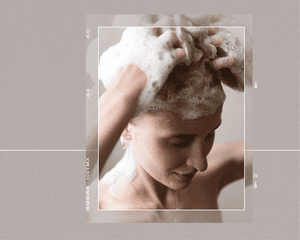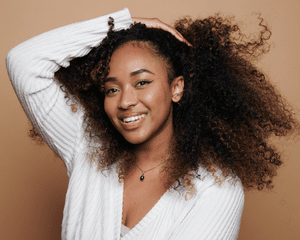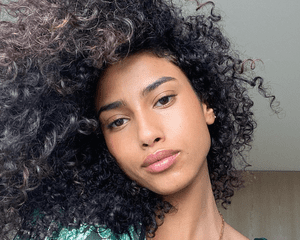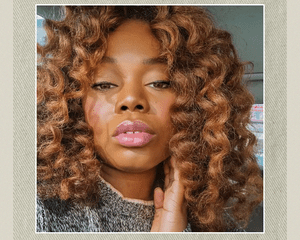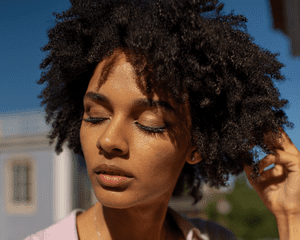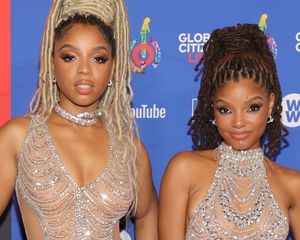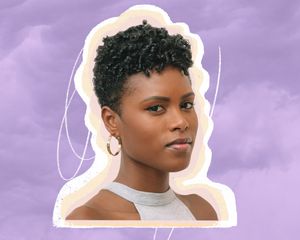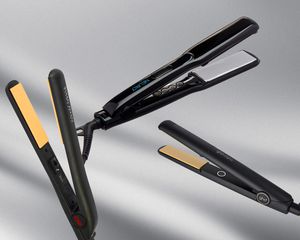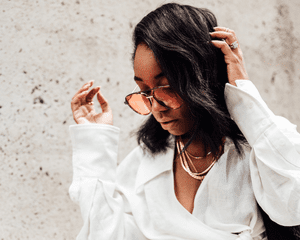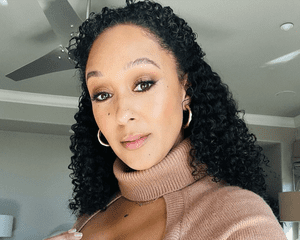
João Ritter / Unsplash
In This Article
If you're thinking of leaving relaxers behind and don't want to cut all of your processed hair off, you'll need some transition styles that will take you from straight hair to your natural texture. While most of these styles are protective, you can still wear your hair out on occasion. Try these hairstyles to get you through the sometimes awkward stages of transitioning, and you'll feel confident that your hair looks good every day. We spoke to several natural hair experts for their tips on transitional styles.
Ahead, check out 40 of the best hairstyles to try while transitioning to natural hair.
Flexi-Rod Sets
:max_bytes(150000):strip_icc()/flexirodset-4b1bb04781a144d9a09040d77afacad3.jpg)
@margeeyah / Instagram
Blend those curly roots with your relaxed ends using wet sets, such as magnetic rollers, flexi-rods, perm rods, or Curlformers. These styles help you control how curly you want your finished style to be, as setting tools come in an array of sizes. Hardges is a big fan of wet sets for the transition period.
- First, section out your dry hair and secure it with clips. Because wet sets don't rely on direct heat, they're gentle. Plus, you're getting the hang of making your straightened hair match your textured new growth, which is a healthy way of transitioning.
- Next, working section by section, apply a hydrating mousse to the hair, brush out, and then wind the strand around the flexi-rod.
- Fold the ends of the flexi-rod inward to gently hold the hair in place as it curls. "Twist-outs are optimal for this type of careful styling," adds Leigh Hardges, a Maxine Salon stylist. "The hair does not need to be held taut for a twist set, and working in sections makes it less likely to tangle."
- Keep in place for several hours, then take down the flexi-rods and separate the curls using your fingers.
Knotless Braids
:max_bytes(150000):strip_icc()/118884944_212332013557386_1961423354626299668_n-41a951a72ced4e8b89a4b120b78184c4.jpg)
More complicated braid styles, like knotless braids, may require a trip to the salon. You can also get some hair additions if you choose this style to add length and give your braider more room to play. If braids are a go-to style for you, they're perfect for dealing with different textures; they also work with varying lengths of hair, with and without extensions.
Sew-Ins
:max_bytes(150000):strip_icc()/164179876_810747779529755_5864972746915341880_n-63af00b67b494aceb14537910bd29dc0.jpg)
For some, weaving hair away during transitioning is much easier than styling it regularly. You can choose extensions that mimic natural hair so that you can get an idea of what your new texture will look like on you. When worn correctly, sew-ins, cut back on the frustration of dealing with different textures during your grow-out phase.
Two-Strand Twists
Two-strand twists are a versatile protective style for natural hair. They can be as thin or wide as you'd like and may be combined with other styles for a totally customizable look. You can twist hair while wet with a curl cream or foam, Hardges explains. "Many like to leave twisted once they have dried, or they can be unraveled to reveal a curly set that can be worn for an additional few days," she adds.
Head Wraps
:max_bytes(150000):strip_icc()/116604524_163543288745147_7666437974110808956_n-1d976502e8c647d8b009ffbc9fae4ef8.jpg)
Head wraps are both stylish and protective. Scarves and wraps work with any number of the styles from this list, but you'll definitely want to invest in one with a silk or satin lining to prevent your coils from drying out or snapping due to friction.
Cornrows
:max_bytes(150000):strip_icc()/71115486_516654362232598_7515114914140907947_n-f5390820098947d4b94331ecc6e8608a.jpg)
Cornrows are one of the simplest transition styles to try—as long as you know how to braid, that is. "Cornrows are braids that are attached to the scalp through the technique of picking up hair at the scalp, much like a French braid," Hardges says.
- First, blow-dry your hair to make sure it's stretched out for maximum length.
- Next, moisturize with a leave-in conditioner. You may also want to apply a mousse or gel for additional hold.
- Add a squirt of hair oil to seal in the moisture from the other products.
- Create two large three-strand braids running along the top of the scalp.
Byrdie Tip
If you like rocking wigs and weaves to get through a hair transition, you can create cornrows as your base style before slipping on a wig or attaching a weave.
Braidless Crochet
Crochet braids are another great option for a transitional style, or you can try a braidless crochet twist, as pictured here. To get the look, hair extensions are affixed to cornrows using a crochet loop. This creates length and volume while allowing the scalp and natural hair room to grow and breathe. The resulting extensions can be braided, twisted, or formed in faux locs.
Braided Crown
:max_bytes(150000):strip_icc()/163034957_168797444972719_7605951749014135680_n-b4b5084a7582415b97838f58eb132f37.jpg)
Braids are incredibly versatile and can be worn down around the shoulders or piled in an intricate top knot at the crown of the head. The latter actually works to suit round faces by drawing the eye upward and elongating the face.
Long Faux Locs
:max_bytes(150000):strip_icc()/174381603_2990902744473884_5391401719105470798_n-6657264d957e4a15a8684bf45462c9dc.jpg)
Faux locs are another transition style that offers up versatility and minimal manipulation. These are extensions that you can easily install on your own or have done at the salon.
- Choose your loc style and section out your hair.
- Then, attach the locs at the root, weaving them in to conceal your natural hair and/or braids.
- When cleansing your locs, wrap them in a microfiber towel like the Aquis Performance Drying Technology Hair Towel for up to 20 minutes to soak up excess water.
Box Braids
:max_bytes(150000):strip_icc()/117334013_748351635915211_7230600337650192980_n-b24f845694ec4186840b5a5cc4da40b2.jpg)
“[Braided extensions] are great for those that live an active lifestyle, as a trip to the gym will not ruin the style,” says Detroit-based hairstylist Niani B. First, understand the different types of braids: "Box are individual braids that are loose. Cornrows are braids attached to the scalp through the technique of picking up hair at the scalp much like a French braid," says Hardges. You'll likely want to hit the salon for these, as they are more time-consuming than other styles and require more expertise.
Jumbo Braids
:max_bytes(150000):strip_icc()/168400567_815829032346995_7440012925683315889_n-2c94f1fb6a7b4969aa3e6c7186f832b3.jpg)
Jumbo braids are the perfect box braid style for those who want to spend little time in their braider's chair. To prevent the style from feeling too heavy, try the knotless braiding technique.
Low Flat Twist Chignon
:max_bytes(150000):strip_icc()/lowbraidedchignon-ce449f2cdb5c48a793f17c8e99a8c945.jpg)
@_whitneythestylist / Instagram
Beautiful cornrows spiral along the scalp into an elegant low chignon. While it might be a bit more time-consuming than your basic cornrows, the results are stunning for a formal occasion.
Hair Puff
:max_bytes(150000):strip_icc()/GettyImages-1304611186-26f7a5ffbb934ee7b4d64a1a9c2aacb6.jpg)
Getty Images
When in doubt, pile your transitioning curls on top of your head in a chic pineapple puff and call it a day.
- Brush a bit of mousse through your hair and pull back into a super high ponytail, securing with an elastic.
- Hydrate the ends by applying a leave-in like Shea Moisture's Jamaican Black Castor Oil Strengthen & Restore Leave-In Conditioner.
- This style also works with wet sets if your curls are not super defined yet.
Twisted Updo
A pseudo-French twist with curly ends looks so elegant. Simply twist your hair under, using bobby pins to hold the twisted shape in place along the bottom of the scalp. The curls will fall over the forehead, creating a faux bang.
Buns
Buns, topknots, and chignons are all easy and elegant ways to style transitioning hair. "The less tension, the better is my rule of thumb when styling hair that is transitioning from relaxed to natural," says Hardges.
- This is one of the easiest styles to create, but be careful not to get lazy about it: Give your hairline a rest from this sleek 'do at least a couple of times per week. This cuts down on the risk of thinning hair around your edges.
- Brush your hair back into a high or low ponytail, using some gel or mousse to slick down flyaways. Then, twist your hair into the bun and secure with bobby pins.
- Style your edges with a product like Shea Moisture's Jamaican Black Castor Oil Strengthen & Restore Edge Treatment or Creme of Nature's Argan Oil Perfect Edges (avoid alcohol-laden gel that will dry out your mane).
Marley Twists
:max_bytes(150000):strip_icc()/marleytwists-b2c6e12de4f64d89b3249c99d026c940.jpg)
@kelliemwagner / Instagram
We know twisted styles come highly recommended as a protective style. "Marley twists have braiding extension hair added to the individual twists," Hardges says. Adding extensions, as with these super long twists, can help your style last longer.
Pink and Black Knotless Braids
:max_bytes(150000):strip_icc()/158965846_120886059931606_3157140698461941042_n-2d605e1f2ba241f08e1e92e6039e9f80.jpg)
Transition styles that use extensions offer a fun opportunity to play with color without damaging dyes. Be sure to care for your edges while you're rocking this style. And as with any braided style, be mindful of how much tension you're applying to your scalp.
Classic Stitch Braids
:max_bytes(150000):strip_icc()/77189588_447069902874116_1164532178351446639_n-5b18d69f62f94cff88093f7743b5238c.jpg)
Stitch braids are a style of cornrows that follow a neat geometric pattern with clean lines running parallel and perpendicular to the braids. Unless you're an expert, this is a look for the styling chair.
Roller Sets
:max_bytes(150000):strip_icc()/curlset-82d294ccd1f64f138befbc21d43d49aa.jpg)
@cinammoncurls / Instagram
Hardges recommends roller sets as another styling method to reduce heat damage. Stretching the roots without excessive heat is essential to maintaining hair health while transitioning from a relaxer to natural hair. "There are so many types of rollers and rods to create as fast or as slow of a curl pattern you desire," says Hardges.
- After washing, section the hair and apply a flexible mousse with a soft hold.
- Next, roll each section up into the roller and let it sit. You can blow-dry the hair to speed up the process.
Short Faux Locs
:max_bytes(150000):strip_icc()/275924627_259480659723454_5134587777836637251_n-a882c182b08f43a693ffdd29738a5d79.jpg)
Faux locs don't have to be long. A short bob makes for a chic, low-maintenance style you can wear for up to six weeks. Just keep in mind: “It is especially important when wearing any protective style to keep the scalp clean and continue nourishing your hair with a moisturizer and oil," Niani B notes.
Braided Bun
:max_bytes(150000):strip_icc()/braidedbun1-b4baec2077ef41baae1dd92f833f1c7d.jpg)
@freshlengths / Instagram
Braided updos keep the hair off the face and your transitioning style protected. Here, cornrows lead into a low-slung bun that is a breeze to achieve. Simply gather your cornrows at the nape of your neck and twist into a low braided bun.
The Silk Press
:max_bytes(150000):strip_icc()/95985875_250504659480727_5260388120961148664_n-97b066a41a04429eb54a98b4bebf133e.jpg)
“For hair transitioning from a relaxer, it’s important to have the texture of the hair be consistent,” Michelle O’Connor, artistic director at Matrix, tells us. For this reason, she recommends the silk press. This style is perfect for naturals who won’t rock their natural texture often but will still want to say goodbye to the chemicals. “[The silk press] can be worn for up to two weeks with a nightly technique of wrapping the hair around the head and tying a silk scarf over it," she says.
Flexi-Rod Bun and Bangs
We love a style that adds a spin on a classic. Here we see how a flexi-rod set can be stretched into a fringe bun so that you never get bored. Make sure to use a curl cream to keep coils hydrated and defined.
Mini Twists
:max_bytes(150000):strip_icc()/87652268_2772540122813635_8011661490492628441_n-93a69caee4094bc7badcd41dd6717928.jpg)
Mini twists can be time-consuming. However, they can last up to six weeks. Using the same technique from two-strand twists on smaller, tighter sections will create this look. You can wash, condition, and trim them. If your ends are still straight, add a few rollers to the ends.
Jumbo Marley Twists
:max_bytes(150000):strip_icc()/119048444_332040594878686_3932809931242772262_n-536977752fe64e53bb85e81c3eb1e976.jpg)
Marley twists are a versatile and low-maintenance protective style featuring two-strand twists. You can wear them long or short and as thin or thick as you like. But we can't get enough of this lengthy jumbo version with whipped baby hairs.
- Cleanse and dry your hair.
- Section hair out to your desired twist placement.
- Create two-strand twists by first folding the extension, then knotting it onto the natural hair.
- Then, using the two sides of the extension, create a two-strand twist.
Bantu Knots
:max_bytes(150000):strip_icc()/bantuknots-aecfd0c5ba7641dba5021cc2adaa408d.jpg)
@shyinstar / Instagram
"Bantu knots are my favorite for transitioning clients to maintain their salon style at home. The roots stay smooth and straight while sleeping or working out, and the ends keep a nice curl without applying more heat," says Hardges.
- As with wet sets, start with dry, cleansed hair that has been sectioned out into the desired size of each knot.
- To begin creating the knots, take down the first section and apply any desired hydrating products.
- Then, create a two-strand twist or braid from that section.
- Take the twisted strand and begin to coil it horizontally toward the scalp. This forms a tight, secure knot.
- Secure the knot by folding the end underneath or using a small bobby pin.
Tiny Locs
:max_bytes(150000):strip_icc()/151070084_1864678947031551_5983923342527586058_n-37a50f481325414fb8bf6c672f6390c3.jpg)
Locs don't have to be super long and thick to make a big impact. We love these tiny blonde locs on mid-length hair. The varying lengths create dimension and lend shape to the overall look.
Butterfly Locs
:max_bytes(150000):strip_icc()/122255150_715965195684233_7407373204980530960_n-c113add045e74d6182c1581fe2757193.jpg)
This style of crocheted locs has a relaxed, slightly lived-in vibe. You install them as you would crochet braids, but the look will be different depending on the extensions you choose. With over 5,000 four-star reviews, the Niseyo Butterfly Locs get our vote.
Wigs
:max_bytes(150000):strip_icc()/155864819_124072172964084_8851501036238905441_n-5f770269f49b4cc8a20b263286c73eb6.jpg)
Not only are wigs a fun and easy way to change up your 'do, but they also prove to be a great transition style. According to celebrity hairstylist Kiyah Wright, “Braiding hair under the wig helps keep the heat off of the hair, but you have to be sure to put a wig cap on to avoid any friction."
Byrdie Tip
Protecting your hair from the inside of your wig is a must. "The construction of the wig can create a break around the hairline, so a stocking cap between your natural hair and the wig is absolutely necessary," Hardges says.
Curlformers
:max_bytes(150000):strip_icc()/89956853_118882113038641_5688829945606553778_n-bb95864044994f28910dfd13164f5cfc.jpg)
Curlformers are another unique, heatless way to create waves. Similar to flexi-rods, this is a wet-set style that seamlessly blends your natural texture with your chemically treated strands.
- Take your Curlformers and the included styling hook. Slide the first Curlformer onto the end of the hook.
- Gather a medium-sized section of hair (too big, and you'll have trouble applying the Curlformer, too small, and the curls may be tighter than you're going for) and mist with water to dampen.
- Apply leave-in conditioner and any additional styling products you'd like to use. Brush through to blend into the hair.
- Twist hair at the root, then attach the hook. Push the Curlformer upward toward the root while pulling the styling hook away. This will feed the hair section into the Curlformer.
- Pull the Curlformer downward while holding it at the root to get the curl to fall properly.
- Air dry or sit underneath a dryer to speed up the drying process. Then remove the Curlformers and shake out your hair, using fingers to separate the curls.
Passion Twists
:max_bytes(150000):strip_icc()/26334753_1931776757039562_8678571429815386112_n-2700b9cda3de4c828b6fc839aea09e2e.jpg)
Passion twists are a hybrid between locs and Senegalese twists created by stylist Kailyn Rogers. They give off a slightly undone appearance that's more boho than standard twists but still easy to maintain. You can get the look with the same steps as two-strand twists, adding extensions.
Silk Press Topknot
A silk press creates an excellent base for any number of transitional styles. Here, straight locks are piled into a loose topknot with a few curled strands hanging around the face. Be sure to protect your hair with a good leave-in and heat protectant like the Design Essentials Natural Agave & Lavender Weightless Thermal Protectant Serum.
Banded Ponytail
:max_bytes(150000):strip_icc()/173763042_494594661572807_5080819661623011695_n-c61f36659ded43d89ebad2ad63cd0c9b.jpg)
Banded ponytails are such cute and easy protective styles to do at home. We love this pigtail version with a crown braid. To create the ponytails:
- Start with dry, cleansed, and hydrated curls.
- Separate into two equally sized sections. Without the braids, you'll need to secure each one at the base of the scalp with an elastic.
- Space several elastics (three to four, depending on length) down each ponytail, fluffing the hair between them for that bubble effect.
Unraveled Braids
:max_bytes(150000):strip_icc()/168791820_144932604224674_3311841459073551587_n-06a7613f70c54d12a2c640bc079bf74b.jpg)
Whether using braided extensions or simply braiding your hair, curling a few inches at the ends adds a relaxed look. This curled-end effect is simply created by wrapping the loose ends tightly around perm rods, followed by dipping braids in hot water for about two minutes. When the hair is cooled and dry, unravel the ends of each braid and you'll have this deep wave.
Headband Wig
Can you believe that this is a wig? The headband wig is one of the easiest, most natural-looking transitional styles that fully protects your hair. Sensationnel's Dashly Synthetic Headband Half Wig will keep you looking fly without breaking the bank.
- Braid your hair and apply a protective cap.
- Slide the hairpiece over the cap the way you would a headband, tying it into place.
- Fluff out the curls.
- You can add a real headband on top to mix up the look.
Braided Bantu Knots
Bantu knots can be braided instead of twisted for a more advanced style. Weaving in some metal wire to this 'do can add a little something extra and dress it up a bit.
Beaded Twists
:max_bytes(150000):strip_icc()/ScreenShot2022-06-05at4.13.15PM-40e882b65aa54b62b24eb9d49da95dab.jpg)
There's no doubt that beads add a funky element to a head full of twists, but they also create a satisfying weight that stretches the hair while it's styled. This actually prevents shrinkage and helps to maintain the length.
Three-Strand Braid
Three-strand braids with styled edges are so classic. Regardless of your braiding skills, you can pull off this simple plait. To really make an impression, slick back your hair into a high braid atop your head and let your length (natural or extensions) do the rest.
Braid-Out
The results of a braid-out can help you meld two textures into one. Look no further than these gorgeous, voluminous curls as proof.
- Wash, condition, and detangle hair.
- Section damp hair and apply a leave-in conditioner and curl cream from roots to ends.
- Braid each section and twist ends around your finger or use a flexi-rod.
- Once hair is completely dry, unravel braids using your fingers to gently separate and style.
:max_bytes(150000):strip_icc()/165717796_753710311998323_3462851892377119313_n-4417699a9ed241bb928736621ad01e55.jpg)

